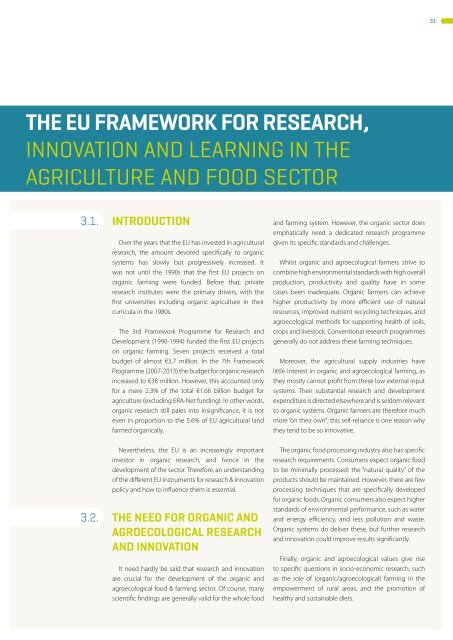tpo_dossier_action-plan-for-innovation-and-learning_201406
tpo_dossier_action-plan-for-innovation-and-learning_201406
tpo_dossier_action-plan-for-innovation-and-learning_201406
Create successful ePaper yourself
Turn your PDF publications into a flip-book with our unique Google optimized e-Paper software.
31THE EU FRAMEWORK FOR RESEARCH,INNOVATION AND LEARNING IN THEAGRICULTURE AND FOOD SECTOR3.1.INTRODUCTIONOver the years that the EU has invested in agriculturalresearch, the amount devoted specifically to organicsystems has slowly but progressively increased. Itwas not until the 1990s that the first EU projects onorganic farming were funded. Be<strong>for</strong>e that, privateresearch institutes were the primary drivers, with thefirst universities including organic agriculture in theircurricula in the 1980s.The 3rd Framework Programme <strong>for</strong> Research <strong>and</strong>Development (1990-1994) funded the first EU projectson organic farming. Seven projects received a totalbudget of almost €3.7 million. In the 7th FrameworkProgramme (2007-2013) the budget <strong>for</strong> organic researchincreased to €38 million. However, this accounted only<strong>for</strong> a mere 2.3% of the total €1.66 billion budget <strong>for</strong>agriculture (excluding ERA-Net funding). In other words,organic research still pales into insignificance, it is noteven in proportion to the 5.6% of EU agricultural l<strong>and</strong>farmed organically.<strong>and</strong> farming system. However, the organic sector doesemphatically need a dedicated research programmegiven its specific st<strong>and</strong>ards <strong>and</strong> challenges.Whilst organic <strong>and</strong> agroecological farmers strive tocombine high environmental st<strong>and</strong>ards with high overallproduction, productivity <strong>and</strong> quality have in somecases been inadequate. Organic farmers can achievehigher productivity by more efficient use of naturalresources, improved nutrient recycling techniques, <strong>and</strong>agroecological methods <strong>for</strong> supporting health of soils,crops <strong>and</strong> livestock. Conventional research programmesgenerally do not address these farming techniques.Moreover, the agricultural supply industries havelittle interest in organic <strong>and</strong> agroecological farming, asthey mostly cannot profit from these low external inputsystems. Their substantial research <strong>and</strong> developmentexpenditure is directed elsewhere <strong>and</strong> is seldom relevantto organic systems. Organic farmers are there<strong>for</strong>e muchmore “on their own”; this self-reliance is one reason whythey tend to be so innovative.3.2.Nevertheless, the EU is an increasingly importantinvestor in organic research, <strong>and</strong> hence in thedevelopment of the sector. There<strong>for</strong>e, an underst<strong>and</strong>ingof the different EU instruments <strong>for</strong> research & <strong>innovation</strong>policy <strong>and</strong> how to influence them is essential.THE NEED FOR ORGANIC ANDAGROECOLOGICAL RESEARCHAND INNOVATIONIt need hardly be said that research <strong>and</strong> <strong>innovation</strong>are crucial <strong>for</strong> the development of the organic <strong>and</strong>agroecological food & farming sector. Of course, manyscientific findings are generally valid <strong>for</strong> the whole foodThe organic food processing industry also has specificresearch requirements. Consumers expect organic foodto be minimally processed: the “natural quality” of theproducts should be maintained. However, there are fewprocessing techniques that are specifically developed<strong>for</strong> organic foods. Organic consumers also expect higherst<strong>and</strong>ards of environmental per<strong>for</strong>mance, such as water<strong>and</strong> energy efficiency, <strong>and</strong> less pollution <strong>and</strong> waste.Organic systems do deliver these, but further research<strong>and</strong> <strong>innovation</strong> could improve results significantly.Finally, organic <strong>and</strong> agroecological values give riseto specific questions in socio-economic research, suchas the role of (organic/agroecological) farming in theempowerment of rural areas, <strong>and</strong> the promotion ofhealthy <strong>and</strong> sustainable diets.


